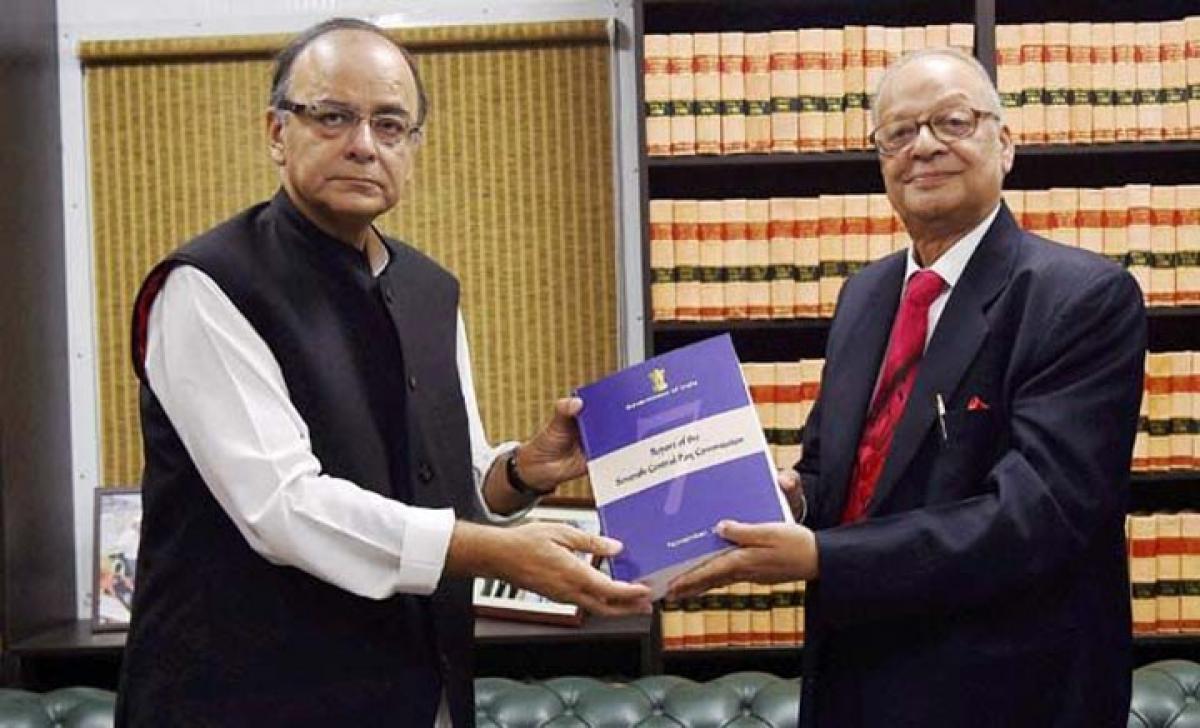Live
- Punjab DGP, MHA official request farmer leader Dallewal to end 20-day fast
- Govt unveils ‘Jalvahak’ to boost inland waterways
- List of criminals: Delhi BJP chief on AAP panel of 38 candidates
- PSBs in India clock record Rs 1.41 lakh crore in net profit in FY24
- Telangana Government Announces Key Development Plans: Bhatti Vikramarka
- Crackdown on illegal poppy farming in Manipur: Assam Rifles destroyed 6,228 acres in 5 years
- South Korea's ruling party leader cancels press conference amid calls for resignation
- AIADMK's big meet discusses 2026 polls, prospective alliances
- BJP questions Congress-Shiv Sena (UBT) alliance over Aaditya Thackeray's Savarkar-Nehru remark
- Maha Oppn to boycott customary CM tea meet, cites rising farmers' distress, atrocities against Dalits
Just In

x
Highlights
The seventh Central Pay Commission rolled out a year-end bonanza for 47 lakh Central Government employees and 52 lakh pensioners across the country as it recommended a 23.55 per cent total increase in salary, allowances and pension along with a virtual one-rank-one-pension for civilians, involving an additional expenditure of Rs 1.02 lakh crore a year.
The seventh Central Pay Commission rolled out a year-end bonanza for 47 lakh Central Government employees and 52 lakh pensioners across the country as it recommended a 23.55 per cent total increase in salary, allowances and pension along with a virtual one-rank-one-pension for civilians, involving an additional expenditure of Rs 1.02 lakh crore a year.
.jpg)
A minimum pay of Rs 18,000 per month and a maximum of Rs 2.5 lakh per month has been recommended by the Commission, headed by Justice A.K. Mathur, which presented its voluminous 900-page report to Finance Minister Arun Jaitley on Thursday.
The recommendations are to be implemented from January 1, 2016, and the financial impact of these will be to the tune of Rs 1.02 lakh crore, out of which it would be Rs 73,650 crore on Central Budget and Rs 28,450 crore on the Railway Budget.
The award of the pay panel will also benefit staff of autonomous bodies, universities and public sector units, Mr Jaitley said after receiving the report.
“In percentage terms, the overall increase in pay and allowance and pensions over the business-as-usual scenario will be 23.55 per cent,” the report said. Within this, the increase in pay will be 16 per cent, in allowances 63 per cent and in pension it would be 23.6 per cent, it said.
The total salary and pension bill of the Central Government, which will also include railway employees, will go up from estimated Rs 4.33 lakh crore to Rs 5.35 lakh crore during 2016-17.
The panel has suggested abolition of the pay band and the grade pay, though it retained the annual increment of 3 per cent.
It has also recommended a fitment factor of 2.57, which will be applied uniformally to all employees.
In case of retired Government servants, it said, their pension should not be deducted from their consolidated pay. The consolidated pay package should be raised by 25 per cent and Dearness Allowance by 50 per cent.
Without calling it one-rank-one-pension (OROP), the Pay Commission recommended a revised pension formulation for the Central Government employees, including para-military personnel as well as for defence staff who have retired before January 1, 2016.
Meanwhile the agencies reported that the Chairman and other member Dr Rathin Roy recommended the age of superannuation for all central armed forces personnel to be raised to 60 years from the current 58 years, another member Vivek Rae did not agree with it. He endorsed the stand of Home Ministry.
The formulation will bring parity between past pensioners and current retirees for the same length of service in the pay scale at the time of retirement.
In a significant recommendation, it enhanced the ceiling of gratuity from the existing Rs 10 lakh to Rs 20 lakh. And the same will be raised by 25 per cent whenever DA be raised by 50 per cent.
In the new pay structure, the grade pay has been subsumed in the pay matrix and the status of the employee, now determined by grade pay, will now be determined by the level in the matrix.
Introduction of a health insurance scheme for employees and pensioners has been recommended. Meanwhile for the benefit of pensioners outside the Central Government Housing Scheme (CGHS) areas, CGHS should empanel those hospitals which are already empanelled under CS(MA)/ECHS for catering to the medical requirement of these pensioners on a cashless basis.
All postal pensioners must be covered under CGHS. All postal dispensaries should be merged with CGHS.
Under the central government employees group insurance scheme, the rates of contribution as well as insurance coverage have now been enhanced suitably. Monthly deduction has been raised from Rs 120 per month to Rs 5,000 and insurance cover from Rs 1.2 lakh to Rs 50 lakh for senior most level. At the bottom of the matrix, it has been raised from Rs 30 per month to Rs 1,500 and the cover hiked from Rs 30,000 to Rs 15 lakh.
The Commission recommended abolition of all non-interest bearing advances and increased the limit for interest-bearing advances for buying home from Rs 7.5 lakh to Rs 25 lakh.
In view of grievances relating to New Pension Scheme (NPS), it suggested steps to improve the functioning of scheme and establishment of a strong grievance redressal mechanism.
The Commission has recommended a consolidated monthly pay package of Rs 4.50 lakh and Rs 4 lakh for chairpersons and members respectively of the regulatory bodies.

Next Story
More Stories
ADVERTISEMENT
© 2024 Hyderabad Media House Limited/The Hans India. All rights reserved. Powered by hocalwire.com







